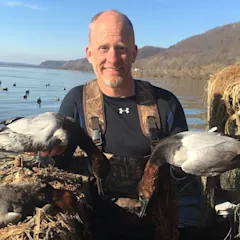We may earn revenue from the products available on this page and participate in affiliate programs. Learn more ›
Every duck hunter has probably poured their heart into a hen mallard symphony only to watch seemingly eager ducks flare or drift away before the shot. And in such moments, out of breath and ideas, you wonder where you erred with your calling. The list could be long, according to champion caller Jim Ronquest. In fact, the seemingly simple act of calling ducks is fraught with pitfalls that even experts can’t avoid.
“I’m guilty of all of them,” says Ronquest, who won the 2006 World Championship Duck Calling Contest and is the producer and co-host of RNT-V. “I make all these mistakes daily.” But even though perfection might elude us, Ronquest says learning to identify common errors and steering clear of them will put more ducks on your strap.
Duck Calling Mistake #1: Calling Too Much
Let’s start with the obvious: Many folks call more than they need to. “I work for a duck call company, and I like to blow duck calls, and I like to call too damn much,” Ronquest says. “I really see that when I go through hunting footage.” Overcalling can take many forms, including situations when hunters call too often and too quickly to turn passing ducks toward them in tight quarters, such as flooded timber.
“We want to get them in pretty quick so they don’t get in on the guys hunting nearby,” says Ronquest. “But you’d be better off letting them breathe a little bit.” Ronquest says hunters should observe birds closely to gauge their reaction before blindly hitting the call again.
“Once you call to ducks, pay attention to their body language—pay close attention to what they’re doing,” he says. “If they’re coming at you hard, sometimes the best thing you can do is leave that call in your pocket.”
Duck Calling Mistake #2: Bad Timing
Many callers produce good sounds and can create convincing routines. In hunting situations, however, when you call is often more important than how well you call.
“Learning timing is the key,” Ronquest says. “The tricky part is that timing can change from day to day. You need to constantly pay attention to how ducks are reacting and how their bodies are moving.”
According to Ronquest, hunters in groups often commit a common mistake he calls the push-pull syndrome, in which callers unintentionally compete with each other and sabotage their efforts.
“The duck will be swinging around, and one guy hits him, and that duck will pull,” he says. “Well, I’m a duck caller, too, so I follow up with the same lick. Now I just pushed him. You pulled him, and I pushed him, and now we’re back to square one and haven’t accomplished anything. In multiple-hunter groups, let there be a lead caller, and learn to read the situation.”

Duck Calling Mistake #3: Unintentional Fouls
Ronquest says hunters make a similar push-pull mistake when callers aren’t watching or working the same group of birds, which leads to uncoordinated calling.
“The other day, we got some ducks that spun around really quickly, and I hit a lick, and they just started into the trees,” he says. “We were 15 seconds from calling the shot. But the guy I was with didn’t see those birds, and he hit a pretty hard chatter. It pushed them out of the hole, and we never got them back. The calling was good, but the timing was bad, and it pushed those birds out.”
The solution? Make sure everyone blowing a call is focused on the same ducks.
Duck Calling Mistake #4: Inflection Errors
Duck hunters also goof-up by using poor inflection—that is, pitch or emotion—in their calling. Ronquest says the quack of a hen mallard provides a good example. A relaxed, unalarmed hen on the water will utter soft, seemingly content quacks. When alarmed, however, the duck will quack with a louder, disturbed tone.
“The mechanics of the sound are the same, but the inflection is different, which gives it a different meaning,” he says. “Learn to understand duck vocabulary and to emulate what ducks are going to do in certain situations. Creating that illusion of sound is a lot of why we do what we do.”
Duck Calling Mistake #5: Missing The Conversation
Ronquest says even skilled callers sometimes neglect the difference between calling at ducks and calling to them. After your calling prompts a reaction from passing birds, you’re no longer trying to get their attention but have started a conversation that will hopefully end by convincing ducks to finish.
“I liken it to a bunch of people at a sports trade show,” he says. “You walk by the guy selling the knives and gadgets, and he’s up there talking to the crowd. But when somebody gets up close, now he’s engaging them—not talking at them but to them.” Groups of hunters not accustomed to calling together often unwittingly fall into that trap.
“If you take four good callers who aren’t used to hunting together, you’re going to break a lot of high ducks and not finish many,” Ronquest says. “Everybody wants to show off, but you won’t finish ducks well unless you let one guy finish them and know how to work together. A group of guys who are used to hunting together will smoke a group of guys not used to hunting together. They’re simply used to working together and working it out.”
Don’t Let Bad Calling Ruin Your Duck Hunt
Don’t fret when you commit calling mistakes. Just try to recognize and avoid obvious errors, and always pay attention to what ducks seem to want that day.
“Regardless of whether you’re in the woods, a rice field, open water, or a lake up North, I think calling mistakes are the same either way,” Ronquest says. “Understanding duck language goes a long way, and understanding timing is essential when calling to ducks.”


